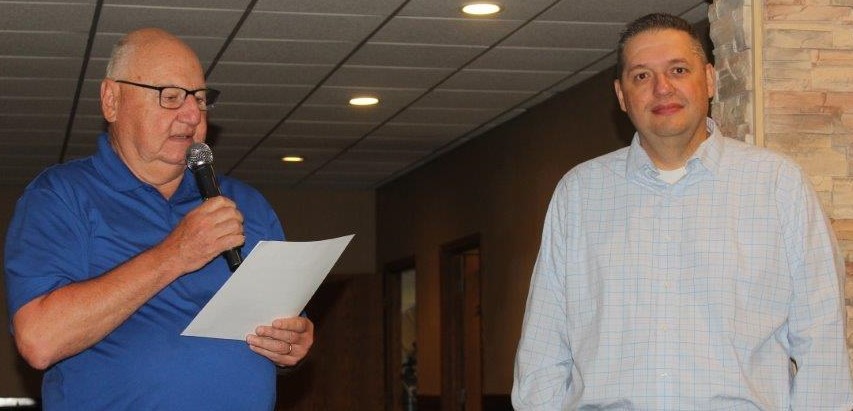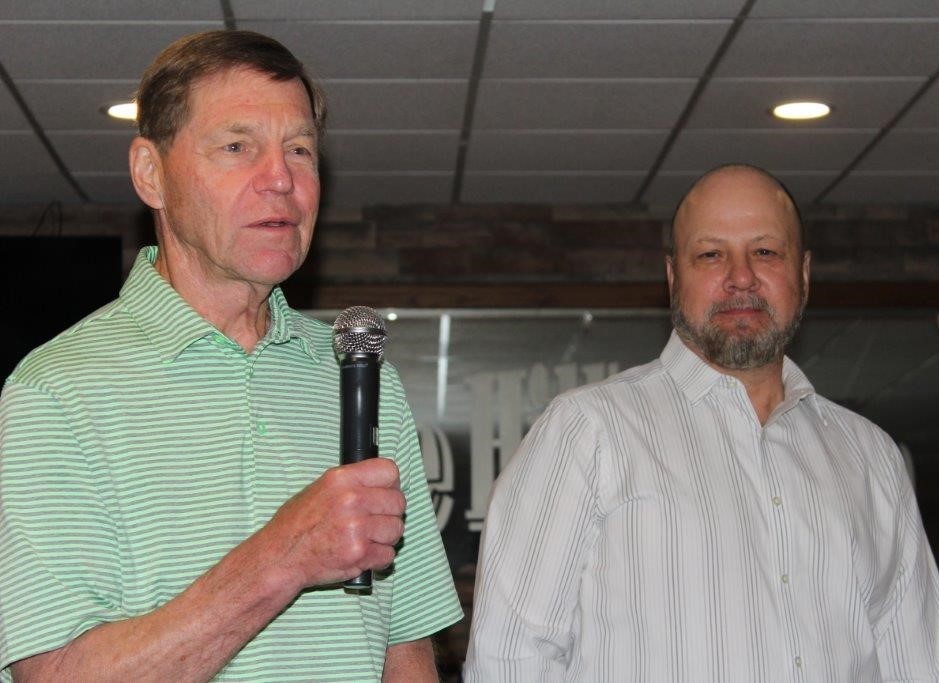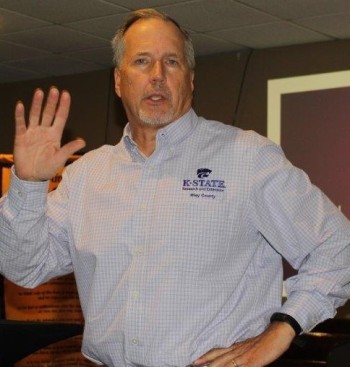The "Manhattan Optimist Club Bulletin": Vol. 2024 #33: 5-15-24
VOLUME 2024 May 15, 2024 NUMBER 33
The May 15, 2024, Manhattan Optimist Club meeting was opened with greetings and a reflection from President, Bill Wisdom, followed by the flag salute.
Gary spoke about his recent trip to learn about agriculture in Brazil that was sponsored by the Kansas Agriculture & Rural Leadership (KARL) program. Thirty eight people, mostly farmers and agriculture industry folks, participated in the Brazilian agriculture tour. Gary described many of the places they visited and included photos of the locations and interesting facts.
Tozan Farm started in 1798 and is owned by the Iwasaki Family: coffee is their main product. Brazil is the number 1 producer of coffee beans in the world. The main type of beans grown here are Arabica beans. They grow, harvest and dry the beans there: the beans are generally roasted and processed elsewhere.
Termite Mounds are found in some pastures: caused by over grazing. They are very hard and can be as high as 36 inches.
Floriculture was the main business at Terra Viva Farms. A Dutch family came to Brazil from the Netherlands and settled in Holambra, the City of Flowers. They have 1200 employees. They grow orchids, amaryllis and many kinds of flowers.
Nova Citra Farm was another coffee plantation that dates back to 1901. They have over1900 acres with 500 acres in coffee. They hosted a coffee tasting shop on the farm.
They got to learn about coffee bean harvesting; the vertical brushes shown on the photos knock the beans off the coffee tree/bush. They drop into the conveyors on the side and are augured up into a storage tank. Beans are spread out on a drying floor before shipping to the roasters.
They visited some orange groves: Brazil is the number one producer of oranges in the world. They deal with “greening disease” that has decimated Florida’s orange groves by half during the last 30 years. Once diseased, the tree will die within a couple of years: there is no cure. Oranges are harvested throughout the entire growing season they are picked intermittently.
Sao Paulo University is a large agriculture college. KSU had had several students come here for advanced degrees in agronomy: three of the students were in the tour group.
Fazenda Santa Monica Farm grows soybeans, corn, and rice. The farm 5000+ acres. This land was formerly covered with trees. In the 1980’s, the Brazilian government opened it up to settlers/farmers, who cleared the land, sold the lumber, and began farming. This farm is 100% no-till. Soybeans averaged 72 bushels per acre. Their rainfall is 60-80 inches per year.
John Deere and Case IH Equipment was common there, like the Midwest USA. There are fences all around the farmstead with barbed wire or razor wire on top and Rottweilers as guard dogs since the family had been robbed twice of all of their ag chemicals.
All farmers have semis there since they do not have a rail system.
Brazilian Beef: most of their beef is grass-fed and heavily influenced by Bos Indicus breeds with are not known for tenderness.
A Brazilian Feedlot, Confineamento, has about 5000 head. Calves are brought in from the north. They have Nellore cattle and Bos Indicus type (Brahman). The pens were flat. There was a windbreak around the backside, concrete bunks, but no “apron”.
They have a good health system for vaccinating the animals.
Pen Riders used mules since they are more sure-footed than horses. Cowboys used a long sorting stick to make them line up for a picture.
Iguacu Falls on the border of Brazil and Argentina were beautiful.
Angus/Red Angus Farm & Ranch: they grilled rib eyes over a wood fire: that was fantastic.
Brazilian Ag in a nutshell: largest soybean, coffee, and orange producing country in the world. They are big on sustainability. Only 9.2 % of the land is used for corn, cotton, dry beans, and soybeans. Much of the rainforest is intact and currently protected.
 The member spotlight was on Jeremy Allen. Jeremy was introduced by Greg McCune. Jeremy joined the club at the suggestion of co-worker, Thad Hall (Kansas State Bank). He has a degree in Business Administration and an MBA. He has been in the banking industry for over 30 years. He has been married to his wife Jill over 20 years and has 5 kids. He enjoys playing golf.
The member spotlight was on Jeremy Allen. Jeremy was introduced by Greg McCune. Jeremy joined the club at the suggestion of co-worker, Thad Hall (Kansas State Bank). He has a degree in Business Administration and an MBA. He has been in the banking industry for over 30 years. He has been married to his wife Jill over 20 years and has 5 kids. He enjoys playing golf.
 Tom Hintz introduced his guest, Jerome Miratsky. Jerome is the owner of Parkview Funeral Home on Poyntz Avenue.
Tom Hintz introduced his guest, Jerome Miratsky. Jerome is the owner of Parkview Funeral Home on Poyntz Avenue.
Greg McCune also gave an update about the upcoming t-ball season. The season should begin on May 20 and go through Thursday, June 27. There is a sign-up sheet for umpires.
The Bill Snyder half marathon is May 25: 12 volunteers have signed up but there is room for additional volunteers.
Bruce Bidwell had some additional comments about t-ball: this year the teams will be co-ed. There will be 8 co-ed teams. There are 2 games (4 teams) per night. They will play 2 nights per week, probably Mondays and Tuesdays. We are waiting for additional details from MPRD.
This past Saturday, we hosted a tournament at Optimist Park. There were 7 8U teams that competed. Club members who volunteered to help with the infield maintenance between games during the tournament include Allen Nesbit, Dan O’Neil, Paul Dittmar, Bill Wisdom, Jim Franke, Bryan Joy, Steve Boeckman, Mel Hunt, and Bruce Bidwell. Another tournament will be held on June 8/9.
Jim Franke talked about the Optimist Park workday that was held on Thursday, May 9th. Seventeen members volunteered to help with park maintenance, including Brad Horchem, Jim Franke, Steve Boeckman, Bruce Bidwell, Rim Fairbanks, Gary Lloyd, Jim Morrison, Mark Locke, Jack Carlson, Jerry Banaka, Steve Springer, Mel Hunt, Mike Fincham, Bryan Joy, Dan O’Neil, and Bob Seymour.
Bill Wisdom announced that he has agreed to be the Lt. Governor for Zone 3.
Bill Wisdom asked for a vote to approve the slate of officers for the upcoming Optimist year, which begins on October 1. The slate includes Greg McCune, president; Clyde Scott, treasurer; Lisa Brummett, secretary; Bill Wisdom, foundation representative. The vote was approved.
Save the dates: Bill Snyder Half Marathon, May 25; Football parking, September 28; Aggieville Chili Crawl, October 19.
Adjourned with the Optimist Creed
MAY 22: NOON MEETING: Steve Havenstein: “Respect for the Law” recognition.
MAY 29: MORNING MEETING: “Club Business Meeting.”

